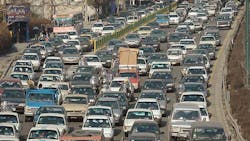Foreign Automakers Find Iranian Market Has Gone Local
TEHRAN, Iran — Foreign automakers seeking a return to the potentially huge Iranian market with the lifting of international sanctions will find the business environment has changed: Former joint venture partners now want to play the game by their own rules.
Iran's auto industry has been a major casualty of penalties imposed over the Islamic republic's nuclear program, with production plummeting and workers laid off because of the ensuing economic slowdown.
France's PSA Peugeot-Citroen and South Korea's Hyundai left the country altogether, while Renault continues to import parts and assemble cars in Tehran but at a fraction of former output.
Total car production was 1.6 million in 2011, but it had halved two years later.
US sanctions on the auto industry in 2013 were the main cause, on top of American and European bans on Iranian bank transactions abroad.
But the auto sanctions were lifted earlier this year after an interim nuclear agreement was reached between Iran and world powers, and a final accord is still on the horizon, raising the prospect of better times for the industry.
That will draw international suitors to Tehran on Monday for the second consecutive Iran Auto Show.
Mercedes Benz, Volkswagen, Renault, Peugeot, Kia and Toyota have confirmed. US carmakers General Motors and Ford were invited but it is unclear if they will attend.
The organizers want to attract foreign investment -- with a population of 77 million the Iranian market is seen as untapped -- but the conditions of a partnership are likely to change.
More Local Production
Under new joint deals, the industry ministry wants 40% of production done in Iran to begin with, rising to 85% after five years.
Iran Khodro, which has a 54% market share in the Islamic republic, plans to return this year to its 2011 production level -- 600,000 cars.
Previously, it had agreements with Peugeot, Renault and Suzuki, but current production is done without foreign tie-ups, Hashem Yekezareh, Iran Khodro's chief executive, told AFP.
"We expect our former partners back in Iran but on the terms that we offer," he said, with particularly tough words for Peugeot-Citroen, noting that "they quit Iran" when the situation deteriorated, adding that they will have "to pay the price for such acts".
Representatives from the French carmaker, for whom Iran was its second-largest market, met Iranian officials in Paris in early October to discuss a possible return.
Iran Khodro now wants a 50-50 joint venture rather than the previous 51-49 ratio in the visitor's favor, encompassing production, sales, technology transfer and access to Peugeot-Citroen's foreign network.
Copyright Agence France-Presse, 2014
About the Author
Agence France-Presse
Copyright Agence France-Presse, 2002-2025. AFP text, photos, graphics and logos shall not be reproduced, published, broadcast, rewritten for broadcast or publication or redistributed directly or indirectly in any medium. AFP shall not be held liable for any delays, inaccuracies, errors or omissions in any AFP content, or for any actions taken in consequence.
